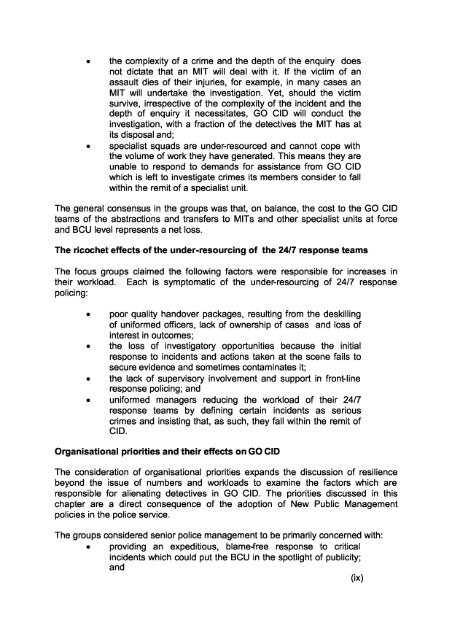LOSING THE DETECTIVES: VIEWS FROM THE ... - Police Federation
LOSING THE DETECTIVES: VIEWS FROM THE ... - Police Federation
LOSING THE DETECTIVES: VIEWS FROM THE ... - Police Federation
Create successful ePaper yourself
Turn your PDF publications into a flip-book with our unique Google optimized e-Paper software.
• the complexity of a crime and the depth of the enquiry does<br />
not dictate that an MIT will deal with it. If the victim of an<br />
assault dies of their injuries, for example, in many cases an<br />
MIT will undertake the investigation. Yet, should the victim<br />
survive, irrespective of the complexity of the incident and the<br />
depth of enquiry it necessitates, GO CID will conduct the<br />
investigation, with a fraction of the detectives the MIT has at<br />
its disposal and;<br />
• specialist squads are under-resourced and cannot cope with<br />
the volume of work they have generated. This means they are<br />
unable to respond to demands for assistance from GO CID<br />
which is left to investigate crimes its members consider to fall<br />
within the remit of a specialist unit.<br />
The general consensus in the groups was that, on balance, the cost to the GO CID<br />
teams of the abstractions and transfers to MITs and other specialist units at force<br />
and BCU level represents a net loss.<br />
The ricochet effects of the under-resourcing of the 24/7 response teams<br />
The focus groups claimed the following factors were responsible for increases in<br />
their workload. Each is symptomatic of the under-resourcing of 24/7 response<br />
policing:<br />
• poor quality handover packages, resulting from the deskilling<br />
of uniformed officers, lack of ownership of cases and loss of<br />
interest in outcomes;<br />
• the loss of investigatory opportunities because the initial<br />
response to incidents and actions taken at the scene fails to<br />
secure evidence and sometimes contaminates it;<br />
•&the lack of supervisory involvement and support in front-line<br />
response policing; and<br />
• uniformed managers reducing the workload of their 24/7<br />
response teams by defining certain incidents as serious<br />
crimes and insisting that, as such, they fall within the remit of<br />
CID.<br />
Organisational priorities and their effects on GO CID<br />
The consideration of organisational priorities expands the discussion of resilience<br />
beyond the issue of numbers and workloads to examine the factors which are<br />
responsible for alienating detectives in GO CID. The priorities discussed in this<br />
chapter are a direct consequence of the adoption of New Public Management<br />
policies in the police service.<br />
The groups considered senior police management to be primarily concerned with:<br />
•&providing an expeditious, blame-free response to critical<br />
incidents which could put the BCU in the spotlight of publicity;<br />
and<br />
(ix)
















